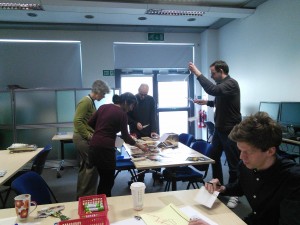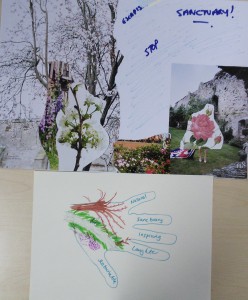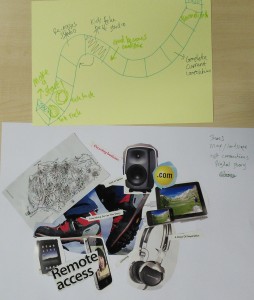We are back after a break with lots of activities to catch up on: this post details a workshop with a staff team rather than our more usual student participants…
Back in February Kaye and I met with my colleagues in the DMU Centre for Enhancing Learning through Technology to introduce them to the wonderful world of Writing PAD. We decided that the most effective way to explain the Writing PAD philosophy was to plunge the team straight into some active learning, rather than to give them information beforehand.

The focus was on a developing ideas for a personal, rather than a professional area of interest: initially we asked the team to use collage to create an image-enriched mind-map, identifying the key themes of their individual project.
Following this, drawing ideas from the mind-map, each member of the team produced a handprint, depicting the five most significant strands: the ‘hands’ were then personalised to reflect each project.

Finally, everyone was asked to visualise the ‘journey’ from initial ideas to completion of their project, using an illustrated ‘roadmap’: possible hurdles and landmarks along the way were identified, and the team were asked to consider the emotional aspects of their project’s journey.

At the end of the workshop, participants wrote a postcard to their ‘future selves’, noting down new avenues they wished to explore towards their project: these were delivered a month later as a reminder to each individual of their planned steps on the road to their goal.
Once the team had experienced Writing PAD in action, Kaye and I delivered a presentation about the background and pedagogic theory underpinning this type of learning and teaching approach. This placed the active learning into context, and presented the rationale for the visual and kineasthetic methods favoured by Writing PAD. We discovered that it was much easier to convey our philosophy in the light of participants’ direct experience of a workshop.
The CELT team felt that this workshop worked particularly well as a group exercise, allowing them to share experiences in a relaxed environment: ‘Delivery as a group activity enhanced its effectiveness.’ It was suggested that this type of workshop might be effective as a way of introducing students to threshold concepts at the start of the year, and also might be an alternative approach to developing an understanding of maths needed to underpin non-mathematical subjects.
Feedback comments also mentioned the refreshing and stimulating nature of this type of activity: “It got me thinking in a way that I’m not used to and I enjoyed thinking differently when approaching the task.” and ‘Enjoyed taking a different route to thinking about a project.’
Next time, we will be introducing Swollage, a brand new activity designed to promote self-reflection, and will shortly be sharing information on our forthcoming Postgraduate event here at DMU on the 5th July: Creative Connections.
Julia